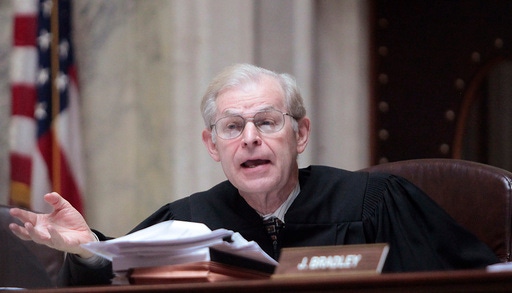David Prosser, who served as Wisconsin Assembly speaker and as a state Supreme Court justice, dies

FILE - Wisconsin Supreme Court Justice David Prosser speaks to Dane County Circuit Court Representative Marie A. Stanton during a hearing at the Wisconsin State Capitol in Madison, Wisc., June 6, 2011. (AP Photo/John Hart, File Pool)[ASSOCIATED PRESS/John Hart]
MADISON, Wis. (AP) — David Prosser, who rose to become speaker of the Wisconsin Assembly before an 18-year tenure on the state Supreme Court that was marked by a heated altercation with another justice, has died. He was 81 years old.
Prosser died on Sunday after battling cancer for several months, his family said in a statement Monday. A Republican, Prosser served 18 years in the Assembly, the last two as speaker, and the same amount of time on the state Supreme Court. He retired from the court in 2016.
Prosser was involved in some of Wisconsin’s most contentious political battles, most notably the 2011 law championed by then-Republican Gov. Scott Walker that effectively ended collective bargaining for most public workers. Prosser ran for reelection that year, which turned that contest into a referendum of sorts on Walker and the proposed law.
Prosser’s narrow victory that April, by 7,006 votes, survived a recount. A couple of months later, he got into a physical altercation with a liberal justice when they were arguing in her office about the court’s ruling that would uphold the anti-union law known as Act 10.
Justice Ann Walsh Bradley accused Prosser of putting his hands around her neck “ in a chokehold ” while the justices were discussing the case in June 2011. The court issued a split decision upholding the law, with Prosser siding with the conservative majority.
The incident was investigated but no charges were filed. The Wisconsin Judicial Commission filed an ethics complaint against Prosser, but the court did not have a quorum to consider it after the three other conservative justices recused themselves.
In 2023, Prosser and two other retired justices were tapped by Republican Assembly Speaker Robin Vos to advise him on whether liberal Justice Janet Protasiewicz could be impeached for comments she made while running for a seat on the court. Prosser advised against impeachment and Vos didn’t pursue it.
Prosser graduated from the University of Wisconsin-Madison law school in 1968. He worked as an attorney for the U.S. Department of Justice and as a lecturer at the Indiana University-Indianapolis law school during the late 1960s and early 1970s.
He was elected to the state Assembly as a Republican in 1978 after a stint as Outagamie County district attorney. A baseball fan, he helped lead the push to provide funding for Miller Park, the Milwaukee Brewers’ stadium now known as American Family Field.
After nearly two years as a member of the Wisconsin Tax Appeals Commission, Prosser was appointed to the Wisconsin Supreme Court in 1998 by then-Gov. Tommy Thompson. Prosser won election to 10-year terms in 2001 and again in 2011. He retired midway through that term, in 2016.
Thompson, who was governor when Prosser was speaker of the Assembly, said in a statement Monday that Prosser “brought common sense solutions to the issues our state faced.”
“I could always count on him to be candid in discussions and results oriented in action,” Thompson said. “David could count votes, and delivered when it mattered.”
Wisconsin Supreme Court Chief Justice Annette Ziegler said Prosser “profoundly shaped the legal, legislative, and judicial landscape of Wisconsin.”
“His exemplary service in all three branches of government demonstrated his unparalleled versatility and dedication to the public good,” she said.
Prosser’s time on the high court was marked by his altercation with Bradley and feuds between the conservative and liberal justices, most notably former Chief Justice Shirley Abrahamson.
Emails emerged in 2011 showing Prosser used an expletive to describe Abrahamson in 2010 and threatened to “destroy” her as the justices debated whether to remove conservative-leaning Justice Mike Gableman from a criminal case.
Upon his retirement, the state Supreme Court named the Wisconsin Law Library across the street from the Capitol for Prosser. But in June, the Wisconsin Supreme Court removed his name in favor of Lavinia Goodell, Wisconsin’s first female lawyer.
Copyright 2024 The Associated Press. All rights reserved. This material may not be published, broadcast, rewritten or redistributed without permission.